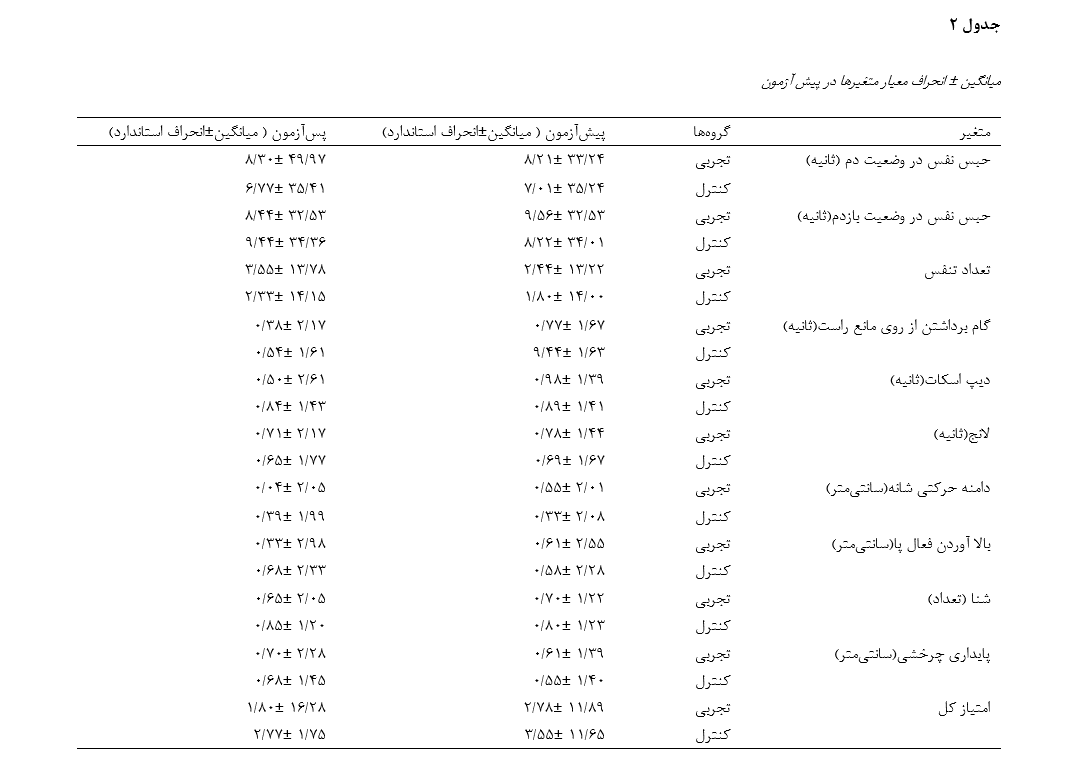The Effect of Dynamic Neuromuscular Stabilization Exercises on Respiratory Function and Movement Quality in Obese Women
Keywords:
The Effect of Dynamic Neuromuscular Stabilization Exercises on Respiratory Function and Movement Quality in Obese WomenAbstract
The aim of this study was to investigate the effects of dynamic neuromuscular stabilization (DNS) exercises on certain indicators of respiratory function and movement quality in overweight and obese women. In this quasi-experimental study, 36 obese women with a body mass index (BMI) greater than 29 and aged between 25 and 45 years were randomly assigned to experimental (n = 18) and control (n = 18) groups. The experimental group participated in three weekly sessions of 45 to 60 minutes of DNS training over a six-week period. Respiratory function was assessed using breath-holding tests (inhalation and exhalation phases) and respiratory rate (breaths per minute), while movement quality was evaluated using the Functional Movement Screening (FMS) test. Assessments were conducted before and after the intervention for both groups. Analysis of covariance revealed that DNS exercises had a statistically significant effect on breath-holding capacity during both inhalation and exhalation, as well as on certain movement quality indicators, including hurdle step, trunk stability push-up, rotary stability, and the total movement score (P < .001). However, no significant differences were observed between groups in respiratory rate, deep squat, in-line lunge, or shoulder mobility (P > .05). The findings suggest that DNS exercises can be effective in improving respiratory function—particularly breath-holding capacity—and certain patterns of functional movement in obese women. Given the limitations concerning some variables, future research employing more precise designs and advanced assessment tools is recommended.
References
Blüher, M. (2019). Obesity: global epidemiology and pathogenesis. Nature Reviews Endocrinology, 15(5), 288-298. https://doi.org/https://doi.org/10.1038/s41574-019-0176-8
Butterworth, A. A., Landorf, K. B., Gilleard, W., Urquhart, D. M., & Menz, H. (2014). The association between body composition and foot structure and function: a systematic review. Obesity Reviews, 15(4), 348-357. https://doi.org/https://doi.org/10.1111/obr.12130
Chaitow, L., Bradley, D., & Gilbert, C. P. (2014). Recognizing and treating breathing disorders: a multidisciplinary approach. [No publisher].
Davidek, P., Andel, R., & Kobesova, A. (2018). Influence of dynamic neuromuscular stabilization approach on maximum kayak paddling force. Journal of Human Kinetics, 61, 15. https://doi.org/https://doi.org/10.1515/hukin-2017-0127
Frank, C., Kobesova, A., & Kolar, P. (2013). Dynamic neuromuscular stabilization & sports rehabilitation. International Journal of Sports Physical Therapy, 8(1), 62.
Freitas, P. D., Ferreira, P. G., Silva, A. G., Stelmach, R., Carvalho-Pinto, R. M., Fernandes, F. L., & et al. (2017). The role of exercise in a weight-loss program on clinical control in obese adults with asthma: A randomized controlled trial. American Journal of Respiratory and Critical Care Medicine, 195(1), 32-42. https://doi.org/https://doi.org/10.1164/rccm.201603-0446OC
Izraelski, J. (2012). Assessment and treatment of muscle imbalance: The Janda approach. The Journal of the Canadian Chiropractic Association, 56(2), 158.
Jung, J., Lee, J., Chung, E., & Kim, K. (2014). The effect of obstacle training in water on static balance of chronic stroke patients. Journal of Physical Therapy Science, 26(3), 437-440. https://doi.org/https://doi.org/10.1589/jpts.26.437
Kim, S. Y., Kang, M. H., Kim, E. R., Jung, I. G., Seo, E. Y., & Oh, J. S. (2016). Comparison of EMG activity on abdominal muscles during plank exercise with unilateral and bilateral additional isometric hip adduction. Journal of electromyography and kinesiology, 30, 9-14. https://doi.org/https://doi.org/10.1016/j.jelekin.2016.05.003
Kobesova, A., Dzvonik, J., Kolar, P., Sardina, A., & Andel, R. (2015). Effects of shoulder girdle dynamic stabilization exercise on hand muscle strength. Isokinetics and Exercise Science, 23(1), 21-32. https://doi.org/https://doi.org/10.3233/IES-140560
Kobesova, A., & Kolar, P. (2014). Developmental kinesiology: Three levels of motor control in the assessment and treatment of the motor system. Journal of bodywork and movement therapies, 18(1), 23-33. https://doi.org/https://doi.org/10.1016/j.jbmt.2013.04.002
Kolar, P., & Kobesova, A. (2010). Postural-locomotion function in the diagnosis and treatment of movement disorders. Clinical Chiropractic, 13(1), 58-68. https://doi.org/https://doi.org/10.1016/j.clch.2010.02.063
Littleton, S. W. (2012). Impact of obesity on respiratory function. Respirology, 17(1), 43-49. https://doi.org/https://doi.org/10.1111/j.1440-1843.2011.02096.x
Mafort, T. T., Rufino, R., Costa, C. H., & Lopes, A. J. (2016). Obesity: systemic and pulmonary complications, biochemical abnormalities, and impairment of lung function. Multidisciplinary Respiratory Medicine, 11, 1-11. https://doi.org/https://doi.org/10.1186/s40248-016-0066-z
Mahdieh, L., Zolaktaf, V., & Karimi, M. T. (2020). Effects of dynamic neuromuscular stabilization (DNS) training on functional movements. Human Movement Science, 70, 102568. https://doi.org/https://doi.org/10.1016/j.humov.2019.102568
Park, D. J., & Park, S. Y. (2019). Which trunk exercise most effectively activates abdominal muscles? A comparative study of plank and isometric bilateral leg raise exercises. Journal of Back and Musculoskeletal Rehabilitation, 32(5), 797-802. https://doi.org/https://doi.org/10.3233/BMR-181122
Park, S. Y., & Yoo, W. G. (2014). Effects of hand and knee positions on muscular activity during trunk extension exercise with the Roman chair. Journal of electromyography and kinesiology, 24(6), 972-976. https://doi.org/https://doi.org/10.1016/j.jelekin.2014.08.012
Pranoto, N. W., Anugrah, S., Fitriady, G., Setyawan, H., Adrian Geantă, V., Sibomana, A., & et al. (2024). The effectiveness of diet and exercise in the management of obesity. Retos: Nuevas Perspectivas de Educación Física, Deporte y Recreación, 58. https://doi.org/https://doi.org/10.47197/retos.v58.105295
Savulescu-Fiedler, I., Mihalcea, R., Dragosloveanu, S., Scheau, C., Baz, R. O., Caruntu, A., & et al. (2024). The interplay between obesity and inflammation. Life, 14(7), 856. https://doi.org/https://doi.org/10.3390/life14070856
Sharma, K., & Yadav, A. (2020). Dynamic neuromuscular stabilization-a narrative. International Journal of Health Sciences and Research, 10(9), 221-231.
Silveira, E. A., Mendonça, C. R., Delpino, F. M., Souza, G. V. E., de Souza Rosa, L. P., de Oliveira, C., & et al. (2022). Sedentary behavior, physical inactivity, abdominal obesity and obesity in adults and older adults: A systematic review and meta-analysis. Clinical Nutrition ESPEN, 50, 63-73. https://doi.org/https://doi.org/10.1016/j.clnesp.2022.06.001
Son, M. S., Jung, D. H., You, J. H., Yi, C. H., Jeon, H. S., & Cha, Y. J. (2017). Effects of dynamic neuromuscular stabilization on diaphragm movement, postural control, balance and gait performance in cerebral palsy. NeuroRehabilitation, 41(4), 739-746. https://doi.org/https://doi.org/10.3233/NRE-172155
Swift, D. L., McGee, J. E., Earnest, C. P., Carlisle, E., Nygard, M., & Johannsen, N. M. (2018). The effects of exercise and physical activity on weight loss and maintenance. Progress in Cardiovascular Diseases, 61(2), 206-213. https://doi.org/https://doi.org/10.1016/j.pcad.2018.07.014
Vincent, H. K., Vincent, K. R., & Lamb, K. M. (2010). Obesity and mobility disability in the older adult. Obesity Reviews, 11(8), 568-579. https://doi.org/https://doi.org/10.1111/j.1467-789X.2009.00703.x
WHO. (2024). Obese and overweight.










